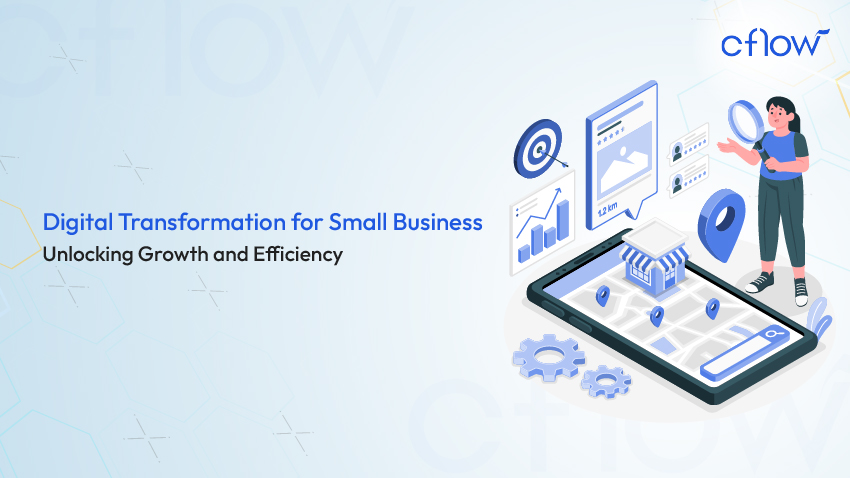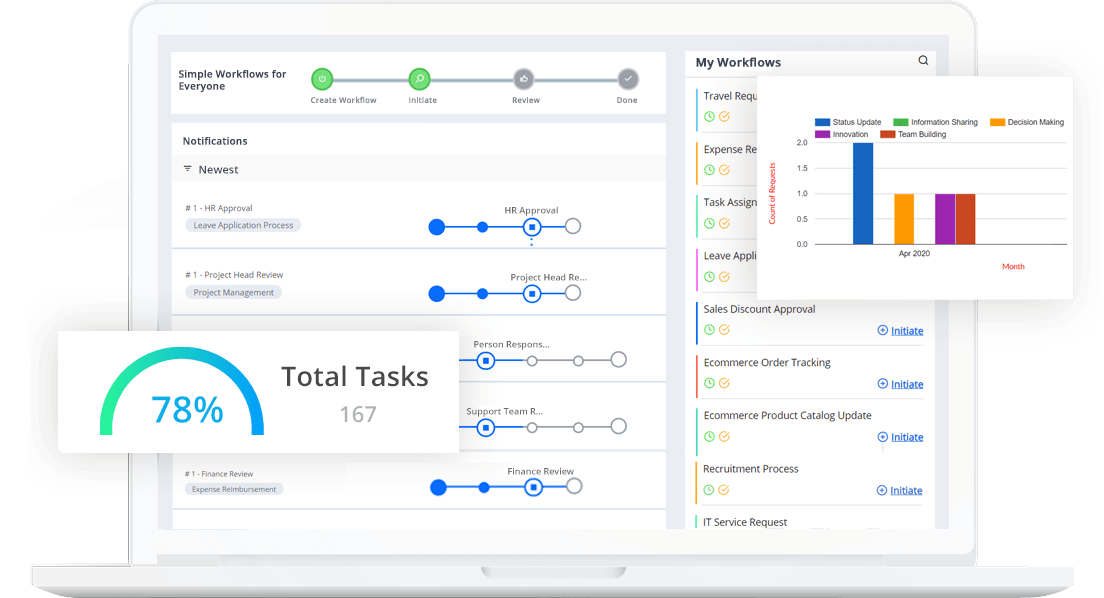Digital Transformation for Small Business: Unlocking Growth and Efficiency

Key takeaways
- Small businesses can increase operational efficiency, enhance customer experiences, and stay competitive through digital transformation for small business.
- Challenges of digital transformation like resource limitations and technology adoption hurdles can slow down digital transformation in small businesses.
- By adopting the right digital transformation strategy for small businesses, small businesses can optimize their processes and increase profitability.
- Cflow’s features help small businesses automate workflows, improve decision-making, and streamline operations to achieve successful digital transformation for small businesses.
Small business digital transformation is no longer optional. Embracing new technologies and digital strategies enhances operational efficiency, improves customer service, and boosts profitability. While larger enterprises may have the resources to implement complex solutions, small businesses must find scalable, cost-effective ways to leverage digital transformation for small businesses.
In this blog, we explore the importance of digital transformation for small businesses, its benefits, challenges, and practical solutions for navigating the digital journey.
Digital Transformation for Small Businesses
Digital transformation for small businesses refers to integrating digital technologies across business functions, which leads to fundamental changes in how companies operate and deliver value. This could mean adopting cloud-based tools, automating routine tasks, improving data management, and enhancing customer engagement through digital channels.
The importance of digital transformation for small businesses cannot be overstated. A report by Forbes highlights that small businesses’ digital transformation leads to increased revenue and operational efficiency. For instance, many businesses have implemented digital transformation strategies for small businesses to streamline communications and sales, significantly improving their response to customer demands.
Table of Contents
Why Start Thinking About Digital Transformation?
In the rapidly changing market, digital transformation for small businesses is a must for staying competitive. It helps businesses streamline operations, reduce costs, and improve customer experiences. Small business digital transformation isn’t just a trend but a long-term strategy for growth. Companies that act early can future-proof themselves, enhance profitability, and stay ahead of market changes.
The Small Business Benefits of Digital Transformation
Digital transformation is not just about adopting the latest technologies—it’s about reshaping how small businesses operate to drive better results, improve customer experiences, and stay ahead of competitors. For small businesses, digital transformation offers a wide range of benefits, from streamlined processes and enhanced productivity to the ability to make more informed decisions. By embracing digital tools, small businesses can compete on a larger scale, improve internal operations, and provide superior service to their customers. Here are some of the key benefits:
More Detailed Customer Insights
Digital tools allow small businesses to gather data on customer behavior, preferences, and feedback, enabling them to deliver more personalized products and services. With small business digital transformation, companies gain insights that help them better understand customer needs, anticipate market trends, and refine offerings to cater to their target audience. Access to detailed customer data empowers businesses to make smarter marketing decisions, improve customer retention, and ultimately increase customer satisfaction.
Improved Business Flexibility and Profitability
One of the main advantages of digital transformation for small businesses is the increase in flexibility and profitability. Automating routine tasks, integrating cloud-based solutions, and using digital tools allow businesses to quickly adapt to changes in the market and customer needs. With the ability to scale operations and optimize workflows, small businesses can improve efficiency, reduce overhead costs, and become more agile in responding to challenges. This greater agility boosts profitability by enabling businesses to capitalize on new opportunities more effectively.
Drastically Enhanced Customer Experiences
Customer expectations have risen significantly with the widespread use of digital technology. Customers now demand faster, more personalized experiences. Small business digital transformation enables businesses to deliver superior customer service through automated communication, personalized recommendations, and seamless online interactions. Whether through e-commerce platforms, chatbots, or personalized emails, small businesses can engage with customers at the right time and place, improving customer satisfaction and loyalty.
Data-Driven Decision-Making
Making decisions based on data rather than intuition is essential for long-term success. Digital transformation for small businesses provides the tools necessary to collect, analyze, and interpret business data in real-time. This data-driven approach allows small businesses to make better decisions, forecast trends, and identify growth opportunities. With accurate, timely insights, businesses can optimize marketing strategies, manage finances more effectively, and streamline operational processes to improve outcomes.
Better Future-Proofing
The business landscape is constantly evolving, and small businesses must be ready to adapt to new technologies and market trends. Small business digital transformation ensures that companies remain adaptable and resilient in the face of uncertainty. By adopting scalable digital tools that can evolve with the business, small businesses can future-proof their operations. Whether through cloud solutions that grow with the company or innovative technologies that enhance service delivery, digital transformation helps businesses stay competitive and prepared for future challenges.
Challenges Small Businesses Face In Digital Transformation
While digital transformation offers numerous advantages, small businesses often encounter several challenges during its initiation. From resource constraints to resistance from employees, overcoming these obstacles is crucial for ensuring a successful digital transformation journey.
Limited Resources
A small business’s digital transformation often faces resource constraints. Financial limitations and a lack of skilled personnel make digital adoption more challenging. This requires businesses to choose scalable, cost-effective tools to ease their digital journey.
Resistance to Change
Employees might resist adopting new technologies. Overcoming resistance requires communication about the long-term benefits of digital transformation for small businesses and proper training to integrate new tools smoothly.
Integration with Legacy Systems
Integrating new technologies with existing infrastructure can be complex and costly. Small business digital transformation needs careful planning to address this barrier by using compatible solutions or updating legacy systems.
Data Security Concerns
As small businesses move data online, digital transformation for small businesses must prioritize cybersecurity. Using secure digital tools ensures sensitive data remains protected during the transition.
Choosing the Right Technology
The vast variety of available tools can overwhelm small business owners. It’s critical to evaluate options carefully and choose technologies that align with the company’s needs and future growth—key to small business digital transformation.
Employee Skill Gaps
A lack of digital expertise can slow down adoption. Small business digital transformation requires upskilling employees and hiring experts to ensure the successful implementation of new tools.
Change Management:
Managing organizational change during digital transformation for small businesses requires structured plans. Ensuring staff engagement through communication and training helps mitigate disruptions and resistance.
How to Manage Digital Transformation for Small Businesses?
Managing digital transformation for small businesses requires a strategic, organized approach that aligns digital initiatives with business goals. As small businesses begin to adopt digital tools and processes, it is crucial to follow a structured process to ensure that the transformation is successful and sustainable. Effective management involves clear planning, the right tools, and the support of the entire organization. Here are the key steps and solutions for managing digital transformation successfully.
Create a Clear Digital Transformation Strategy
Start by defining a comprehensive strategy that outlines your vision for digital transformation. This strategy should be aligned with your business goals and should detail the specific digital tools, processes, and outcomes you want to achieve. Without a clear roadmap, businesses may struggle with direction and end up wasting time and resources on disjointed initiatives.
Identify Key Business Goals and KPIs
Before implementing digital tools, identify the key objectives you want to achieve. Whether it’s improving operational efficiency, increasing sales, enhancing customer service, or expanding your market reach, having clear, measurable goals is essential. Use KPIs to track progress and determine the success of your digital transformation efforts.
Choose Scalable Digital Tools
Selecting the right digital tools is crucial for successful transformation. Small businesses should focus on solutions that are scalable and flexible enough to grow with the company. Look for tools that offer cloud capabilities, ease of integration with existing systems, and support for automation. Ensure that the technology you choose will meet your current needs while being able to adapt as your business expands.
Ensure Proper Change Management
Change management is critical for small business digital transformation to succeed. Employees may be resistant to new systems, fearing disruptions to their workflows. To manage this, communicate the benefits of digital transformation to your team, get their buy-in early, and involve them in the planning process. Developing a clear change management plan that includes timelines, milestones, and feedback loops will make the transition smoother.
Invest in Employee Training and Development
Employees play a key role in the success of digital transformation for small businesses. Providing regular training and upskilling opportunities is essential to ensure that your team is comfortable with the new systems and technologies. Offering hands-on training sessions, workshops, or e-learning courses can help employees adapt more quickly and confidently.
Foster a Culture of Innovation
A culture of innovation within the organization can drive the success of small business digital transformation. Encourage employees to embrace new ways of working, experiment with new ideas, and contribute to the process of digital innovation. Recognize and reward creative solutions that help improve operations or customer service. Creating an environment that embraces change will help overcome resistance and motivate employees to be more engaged in the transformation process.
Leverage Data to Make Informed Decisions
Digital tools provide access to valuable data and insights. Make use of this data to track the effectiveness of your digital transformation initiatives. Use real-time data to adjust your strategy, optimize processes, and make informed decisions. By relying on data-driven insights, small businesses can continuously improve their digital transformation efforts and achieve their business goals more effectively.
Prioritize Customer-Centric Solutions
Ultimately, small business digital transformation should enhance the customer experience. As you implement new digital tools and processes, ensure that customer satisfaction is always a top priority. Focus on streamlining customer interactions, improving product/service offerings, and delivering personalized experiences. Digital tools like CRM systems, e-commerce platforms, and AI-driven customer support can significantly improve the way you engage with customers.
Monitor Progress and Adjust as Needed
Digital transformation is an ongoing process that requires constant monitoring and adjustment. Regularly evaluate the effectiveness of your transformation efforts using KPIs and other performance metrics. Be prepared to make adjustments to your strategy as needed based on feedback, technological advancements, or changes in business goals.
Seek Expert Advice and Partnerships
If managing digital transformation seems overwhelming, consider partnering with experts or consultants who specialize in small business digital transformation. They can offer valuable insights, recommend the best solutions for your business, and guide you through the process. Expert advice can help you avoid common pitfalls and accelerate your transformation journey.
End-to-end workflow automation
Build fully-customizable, no code process workflows in a jiffy.
Examples of Digital Transformation in Different Industries
Digital transformation is revolutionizing various industries, helping small businesses improve operations, enhance customer experiences, and drive growth. From healthcare to education, adopting digital tools and technologies allows businesses to streamline processes, reduce costs, and stay competitive. Here are examples of how digital transformation is impacting small businesses across different industries.
Healthcare: Digital tools like patient management systems and telemedicine platforms significantly improve patient care, efficiency, and regulatory compliance for small healthcare businesses.
Retail: With e-commerce platforms, personalized marketing, and inventory systems, small business digital transformation helps retailers meet evolving customer expectations.
Marketing: Digital tools such as automated campaigns and analytics are key to small business digital transformation in marketing, driving customer acquisition and retention.
Finance: Small business digital transformation in finance includes cloud-based accounting, online payments, and financial management software that simplifies processes and enhances accuracy.
Insurance: Small business digital transformation in insurance streamlines claims processing, provides customer portals, and uses AI-driven tools to improve efficiency.
Logistics: Automated supply chain management tools help small logistics businesses optimize operations, increase efficiency, and cut costs.
Real Estate: Tools like virtual tours and CRM systems are transforming how small businesses in real estate engage with clients.
Education: Digital classrooms, student management, and online learning platforms are revolutionizing education for small businesses.
How Cflow Facilitates Digital Transformation for Small Businesses
Cflow is a powerful workflow automation tool designed to streamline and simplify business processes, making it an ideal solution for digital transformation for small businesses. Cflow’s easy-to-use interface and scalable solutions allow small businesses to manage their digital transformation journey smoothly, enhancing both internal operations and customer experiences.
Visual Workflow Builder:
Cflow’s Visual Workflow Builder allows small businesses to map out, automate, and optimize business processes, which is essential for small business digital transformation.
Drag-and-Drop Form Designer:
Creating customizable forms is made easy with Cflow’s Drag-and-Drop Form Designer, facilitating smoother data collection and management in the digital transformation for small business journeys.
OCR for Data Extraction:
Cflow’s OCR technology automatically extracts data from documents, reducing manual data entry and enhancing efficiency in small business digital transformation.
Integration Capabilities:
With Cflow’s integration features, businesses can seamlessly connect with other tools, overcoming the challenge of integrating new technologies with legacy systems during digital transformation.
Mobile Accessibility:
Cflow’s mobile app ensures that small business digital transformation supports flexibility, allowing business owners and employees to manage workflows on the go.
Final Thoughts
Digital transformation for small businesses is no longer a luxury—it’s a necessity for achieving growth, operational efficiency, and long-term sustainability in today’s competitive market. Embracing the right digital tools can empower small businesses to streamline their operations, improve productivity, and deliver exceptional customer experiences. With solutions like Cflow, small businesses can automate workflows, enhance collaboration, and make data-driven decisions that drive success. By adopting the right technology, businesses can future-proof themselves, adapt to changing market conditions, and scale with ease.
Ready to begin your digital transformation journey? Sign up for Cflow today and discover how we can help streamline your operations.
FAQs
- What is Digital Transformation for Small Businesses?
Digital transformation for small businesses involves adopting digital technologies to improve efficiency, streamline processes, and enhance customer experiences. It helps small businesses remain competitive in a fast-paced market. - How Does Cloud Collaboration Benefit Small Businesses?
Cloud collaboration tools support small business digital transformation by enabling teams to share data, collaborate in real-time, and access important resources from anywhere, improving productivity and reducing costs. - How to Choose the Right Cloud Collaboration Tool for Small Business?
Choosing the right cloud collaboration tool involves evaluating ease of use, scalability, integration, security, and cost. For small business digital transformation, it’s crucial to select tools that align with business needs and future growth.
What should you do next?
Thanks for reading till the end. Here are 3 ways we can help you automate your business:

Do better workflow automation with Cflow
Create workflows with multiple steps, parallel reviewals. auto approvals, public forms, etc. to save time and cost.

Talk to a workflow expert
Get a 30-min. free consultation with our Workflow expert to optimize your daily tasks.

Get smarter with our workflow resources
Explore our workflow automation blogs, ebooks, and other resources to master workflow automation.
What would you like to do next?
Automate your workflows with our Cflow experts.



